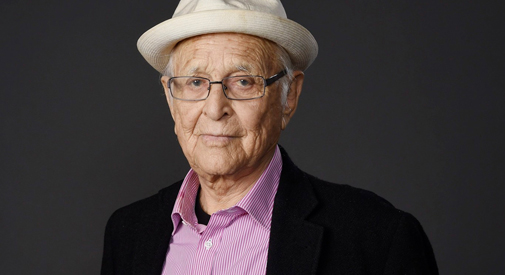‘Norman Lear: Another Version of You’ shows how TV man channeled his times
Given all the racially triggered violence and dissent sweeping the country, let alone the debates about “all lives” vs. “black lives” mattering, many have said we’ve flashed back to 1968, with its fist of defiance in Mexico City, Black Panthers and rioting in the streets. Back then, a Jewish kid from New Haven, Conn., by the name of Norman Lear – the subject of Heidi Ewing and Rachel Grady’s warm documentary “Norman Lear: Just Another Version of You” – was toiling as a skit show scribe, drinking it all up and channeling the painful divide into something meaningful, if not healing, a satirical jab that would make audience members laugh while it forced them to confront their own biases and the sad realities of prejudice in America. It would take a few more years, but when Lear got CBS to greenlight “All in the Family” (1971) it would change the landscape of TV forever, paving the way for socially attuned shows of today such as “Blackish.”
 To underscore that point, TV producer Philip Rosenthal (“Everybody Loves Raymond”), one of the many talking heads testifying to Lear’s legacy, breaks the history of television into two periods: “Before Norman and After Norman.” Beyond “All in the Family,” Lear of course would continue to push boundaries throughout the tumultuous ’70s with a string of progressive sitcoms that included “Good Times,” “Maude” and “The Jeffersons.” The reality, Lear reveals, was not as easy to deliver as the zingers that fell from the lips of Archie Bunker and George Jefferson. “Good Times,” the iconic staple of its time (1974-79), with Jimmie Walker’s indelible “What’s happening” barked in every high school hallway, received backlash from the black community and its stars (Esther Rolle and John Amos) for what was perceived as playing the black family experience too broadly. Rolle, seen in archival footage, had very distinct opinions and clashed with Lear during planning sessions. “The Jeffersons” would become a do-over of sorts for Lear, who felt that series provided a more genuine voice about race and being black in America.
To underscore that point, TV producer Philip Rosenthal (“Everybody Loves Raymond”), one of the many talking heads testifying to Lear’s legacy, breaks the history of television into two periods: “Before Norman and After Norman.” Beyond “All in the Family,” Lear of course would continue to push boundaries throughout the tumultuous ’70s with a string of progressive sitcoms that included “Good Times,” “Maude” and “The Jeffersons.” The reality, Lear reveals, was not as easy to deliver as the zingers that fell from the lips of Archie Bunker and George Jefferson. “Good Times,” the iconic staple of its time (1974-79), with Jimmie Walker’s indelible “What’s happening” barked in every high school hallway, received backlash from the black community and its stars (Esther Rolle and John Amos) for what was perceived as playing the black family experience too broadly. Rolle, seen in archival footage, had very distinct opinions and clashed with Lear during planning sessions. “The Jeffersons” would become a do-over of sorts for Lear, who felt that series provided a more genuine voice about race and being black in America.
The two documentarians, who also collaborated on “Jesus Camp” (2006) and “Detropia” (2012), wrap their arms around Lear with hagiographic adoration much the same way Noah Baumbach and Jake Paltrow did in “De Palma,” their rewind of the career of Brian De Palma and his Hitchcock-influenced directing career. Lear, 93 but agelessly spry, gets trotted out in his signature pork-pie hat for the very congenial affair. It all goes pretty much from cradle to golden oldie in controlled order, beginning with Lear’s chaotic childhood (dad got mixed up with the wrong people on a ill-advised business venture) and through the years working on the classic comedy shows of the 1950s and ’60s with the likes of Jerry Lewis and Dean Martin. Adding their notable mugs to the deserved love-in are George Clooney, Amy Poehler and Jon Stewart, who further testify to Lear’s influence and bitting genius.
Lear, avuncular, cheery and winning, is just as disarming in clips from old talk shows, calmly fielding pointed, if not agitated questions about his agenda. His cool, calm demeanor and ability to reflect and redirect invites and provides insight into the process of taking political hot potatoes and turning them into self-reflective laughing points, and “Just Another Vision of You” is at its strongest when it juxtaposes clips of controversy-inviting subjects on Lear’s shows, such as the draft and Vietnam War, abortion, bigotry and civil rights, against the shifting state of affairs of Nixon’s 1970s.
The film loses its legs when the directors try to get cute. The framing dramatization of a 9-year-old Norman Lear on a stage in a pork-pie hat is a nice novel, touch, but adds little and ultimately feels out of context with the rest of the film’s more journalistic approach. The tempo is also inconsistent; much time is given to the “Good Times” friction and Maude’s abortion, while other threads of envelope-pushing with the Bunkers and Jeffersons feel under-explored. There’s one promising scene where Lear meets with Mel Brooks and Carl Reiner. When the camera follows Lear in, you drool, expecting a roundtable of comedy legends telling bawdy yarns, but it’s over before it begins. And like that too, much of the film feels pushed and rushed, missing some of the more deeply reflective moments and insights that made “De Palma” so compelling. Lear beams winningly throughout, though. He’s got to be America’s most likable nonagenarian, notoriety or not, with the best stories.
Tom Meek is a writer living in Cambridge. His reviews, essays, short stories and articles have appeared in The Boston Phoenix, The Rumpus, Thieves Jargon, Film Threat and Open Windows. Tom is a member of the Boston Society of Film Critics and rides his bike everywhere. You can follow Tom on Twitter @TBMeek3 and read more at TBMeek3.wordpress.com.

